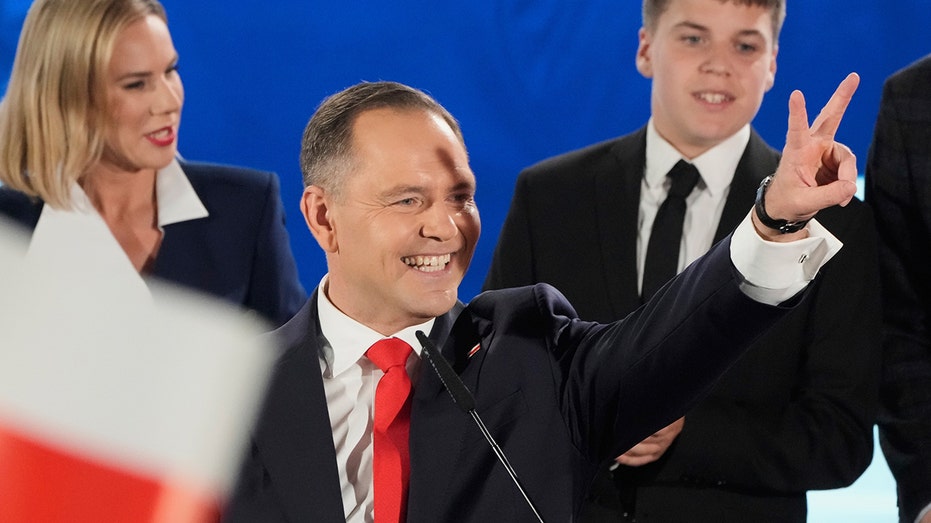Polish Conservative Karol Nawrocki Wins Presidential Election, Set to Succeed Duda
Trump-backed conservative Karol Nawrocki narrowly defeats Rafał Trzaskowski in Poland's tense presidential runoff.

Poland has entered a new chapter in its political trajectory after Karol Nawrocki, a conservative figure closely aligned with President Donald Trump, secured the presidency in a tightly contested runoff election. According to the official tally released on Monday, Nawrocki achieved victory with 50.89% of the vote, narrowly edging out liberal Warsaw Mayor Rafał Trzaskowski, who garnered 49.11%. The results highlight the profound divisions that persist within Polish society, particularly along issues related to Poland's position on the eastern flank of NATO and the European Union.
Nawrocki will take office as the successor to Andrzej Duda, another conservative whose second and final term concludes on August 6. In a gesture reflecting the tension and high stakes of the contest, Trzaskowski publicly congratulated Nawrocki and thanked his supporters for their commitment. "I fought for us to build a strong, safe, honest, and empathetic Poland together," Trzaskowski stated, expressing regret over his narrow loss and resolve to continue advocating for his vision.
The presidential race unfolded amidst intense scrutiny from both the United States and the European Union, with observers citing Poland’s robust economic performance as a key backdrop to the political contest. The campaign drew international attention, with high-profile endorsements: U.S. Department of Homeland Security Secretary Kristi Noem appeared in Warsaw to support Nawrocki, commending Poland’s hardline border policy and warning that a liberal victory could jeopardize the country’s security. Nawrocki also enjoyed a boost from a White House visit with President Trump during the campaign’s closing weeks, further underscoring the significance of relations between Warsaw and Washington.
Congratulatory messages quickly poured in from global leaders, including Ukrainian President Volodymyr Zelenskyy, who called Poland a "pillar of regional and European security." Zelenskyy expressed hope for the continuation of strong bilateral cooperation under Nawrocki, emphasizing the importance of unity and mutual reinforcement among European nations in the face of ongoing challenges.
With approximately 10,000 U.S. troops stationed in Poland, the outcome of the election could herald a deepening of military ties between the countries. Nawrocki’s rallies frequently featured American flags, and many of his backers voiced expectations that he would restore what they saw as "normality"—a theme often invoked by supporters of Donald Trump in the United States. This alignment may signal a shift in Poland’s international posture, particularly in its relations with conservative governments abroad.
At home, Nawrocki, a 42-year-old amateur boxer and historian, has struck a balance between promising continued support for Ukraine and voicing criticism of President Zelenskyy, arguing that some Ukrainian refugees have benefited disproportionately from Polish generosity. He has pledged to prioritize Polish citizens for social and welfare programs such as healthcare and education, positioning himself as a defender of national interests—a stance that resonated with a significant portion of the electorate.
Among European leaders, reactions were mixed but largely respectful. Hungarian Prime Minister Viktor Orbán, who shares Nawrocki’s national conservative values, celebrated the result as a "fantastic victory." In contrast, European Commission President Ursula von der Leyen offered a more measured response, highlighting the importance of continued collaboration between Poland and the EU based on shared democratic principles.
Nawrocki's win marks a notable resurgence for the Law and Justice party, which governed Poland from 2015 until 2023 before being unseated by Prime Minister Donald Tusk’s centrist coalition. Outgoing President Duda’s use of veto power has already complicated efforts by Tusk’s government to enact progressive reforms, including changes to abortion laws and the introduction of civil partnerships for same-sex couples. With Nawrocki now set to assume the presidency, political analysts predict that similar obstacles may persist, making it challenging for Tusk to deliver on electoral promises and potentially emboldening conservative factions ahead of the next parliamentary elections in 2027.
As Poland prepares for this leadership transition, the country stands at a crossroads, with the outcome likely to shape not only domestic policy but also its role on the European and world stage. The razor-thin margin reflects a deeply divided electorate, signaling that debates over national identity, sovereignty, and Poland’s place in the global order will remain at the center of its political discourse for years to come.




